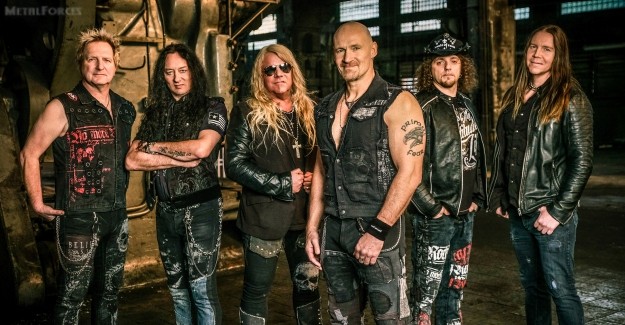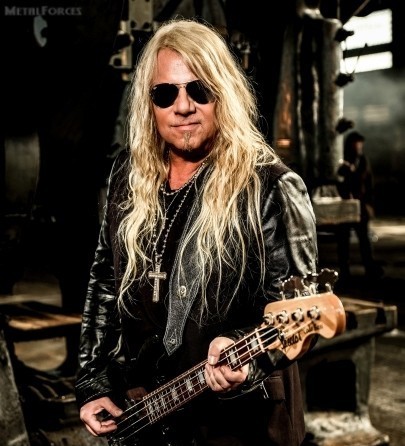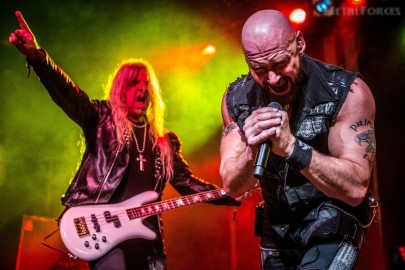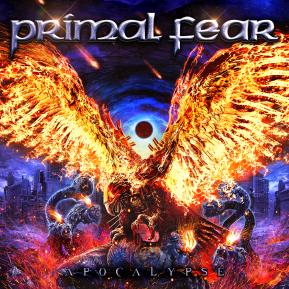
PRIMAL FEAR – Hail To The Fear
Anthony Morgan
August 2018
 Primal Fear (l-r): Tom Naumann, Alex Beyrodt, Mat Sinner, Ralf Scheepers, Francesco Jovino and Magnus Karlsson |
![]()
German power metal outfit Primal Fear developed a fresh strategy with respect to January 2016 full-length Rulebreaker, past albums having been somewhat different in terms of the recording process. Past albums were recorded in a slightly different manner, with different studios and different engineers being utilised. That fresh strategy was implemented once again with August 2018 affair Apocalypse, Primal Fear’s 12th studio jaunt.
“We were very happy with how we created Rulebreaker, we were very happy with the whole progress and the whole strategy, and so we kept it on the new album,” emphasizes Mat Sinner, bassist of Primal Fear. “It was also a process of finding the right way for us to do it, at that time. We just have different songs, different melodies, different guitar lines, different riffs, and a little bit of other things here and there, and a little bit of a different attitude. We were very happy with Rulebreaker, and so there were no super-big changes needed.
“I think it was the right way to do it. We’re collecting ideas all of the time, over let’s say a period of a year. We sit down, and talk about the ideas and suggestions of the guys. Mostly, it’s me and Magnus Karlsson who are responsible for the 11 songs on the new album; I’m involved in every track, while Magnus Karlsson is involved in 80% of the tracks. Ralf (Scheepers, vocals) added some ideas; Tom (Naumann, guitars) wrote a song together with me and Ralf called ‘The Ritual’ and Alex (Beyrodt) wrote a song with me and Ralf called ‘Into The Fire’. Ralf added his melodies and wrote two or three lyrics; if you leave out the bonus tracks, Ralph wrote the lyrics for ‘New Rise’ and most of ‘Blood, Sweat & Fear’. The rest of the lyrics were written by me. So, that’s the songwriting – everybody was involved in the process.
“We did a big pre-production, which takes us a long time. We think this is the most important thing to get a view of how the songs will be in their final stages, so we had a long pre-production. From 20 songs, we decided which 14 we wanted to record. Then we went into a recording studio which has a huge drum room in Denmark, and recorded the drums. We recorded the guitars in Sweden and France, and then bass and vocals in Germany. We then went back to Denmark for the mixing and mastering of the album. With breaks, the whole process took around a year.
“We have a lot of fans around the world who are happy about a new Primal Fear album. We can’t come up with a jazz rock album at the moment. It was clear what kind of music we want to do, and how it should sound. It was really following the path of an album that we were very happy with, and now we have another album that we are very happy with. I don’t know we will do it on the next album, but in this case, this time, we are very happy.”
A large portion of responsibility lies in the hands of the producer, the producer in question being the rhythmist himself. “As a producer, I’m responsible for the final product,” he recognises. “I’ve produced this band since the beginning, but the guys trust me, and they also trust my choices. There were some songs where it was clear from the beginning when you we were writing them, that they had to appear on the album. They were of the quality level that we wanted. We really worked on that, and there were some songs that we discussed in a really democratic way, like which ones to choose. We could have recorded 11 songs, but we recorded 14 songs because we wanted to come up with something great for the fans – some bonus tracks, and stuff. We chose the track listing in a very democratic way.”
Compositions omitted from a final track listing tend to be simply not up to standard, this perhaps being the case where Apocalypse was concerned. “It was a decision of the moment,” Mat reflects. “We made decisions, and we have to stick by those decisions. Primal Fear was never a band who picked up an old song for a new album. We always write new songs because with the status of the band, the songs will be different in a year and a half. I think the songs that weren’t used on Apocalypse won’t be used in the future.”
 Mat Sinner |
![]() Primal Fear’s individual personnel have known one another in excess of 20 years, the songwriting dynamic arguably strengthening through the years. “We already know the good things and the bad things of each person,” the four-stringer cites. “It’s grown like a brotherhood in the last few years, because of the immense touring and the long time on the road together. Everybody knows each other so well, so everybody can come up with some stuff. We discuss it in a very nice way, and also it was the same as the way we recorded this album. It was very creative, and there wasn’t too much talking.”
Primal Fear’s individual personnel have known one another in excess of 20 years, the songwriting dynamic arguably strengthening through the years. “We already know the good things and the bad things of each person,” the four-stringer cites. “It’s grown like a brotherhood in the last few years, because of the immense touring and the long time on the road together. Everybody knows each other so well, so everybody can come up with some stuff. We discuss it in a very nice way, and also it was the same as the way we recorded this album. It was very creative, and there wasn’t too much talking.”
The individual traits of Primal Fear’s guitarists are reflected within Apocalypse’s musical content. “On Apocalypse the album, it’s very clear to hear that we have three very good guitarists who have a different style and a different sound, a different attitude,” Mat critiques. “Alex Beyrodt is more the blues guitarist; he comes more from blues rock roots. He plays a Stratocaster, if he wants, or he plays a Les Paul if he wants. Magnus Karlsson comes from the prog rock scene; he’s a very technical, fast, precise player with wonderful attitude.
“Tom is the pure rock ’n’ roller, which is a very good lead guitarist. He has a great tone, but also super-atomic guitar riffs. He’s more the rock ’n’ roll style kind of guy. For me, it’s very nice to work with these guys, because it’s really a great thing to have three different guitarists than just one person having their style. We can come up with some very different sounds, and very different playing. I think it was never as strong as it is on this album.”
Albeit “all new songs” and “a new attitude,” Apocalypse is still rooted within Primal Fear’s long-standing musical framework. “It’s still Primal Fear, and we won’t change our style of metal and the kind of music that we do, because we already do exactly what we love,” the composer enthuses. “I think it’s just traditional heavy metal, with the possibilities to approach modern riffs and a modern style, and also have the freedom to write songs. For example, on the new album there’s ‘Eye Of The Storm’, which is eight minutes long; it’s very epic, and has a lot of different parts and tempos. It’s really kind of prog rock.
“I think the basic idea is always some kind of metal, but on a lot of albums, we have songs – like ‘Eye Of The Storm’ – which for us are a musical challenge, in order to keep ourselves busy. I think it’s more difficult to write a song about ten minutes, which is always interesting during the whole song. This is a big challenge for us, and we will keep this challenge. For us, it’s very important that we can do that. It wouldn’t be cool to write an album with ten songs on it which are three minutes, so we have to have that chance to explore other territories in this kind of music, but the basic is always heavy metal.
“Primal Fear at its most basic is traditional metal, but we still have the freedom to explore other stuff in metal. I can’t relate Apocalypse to any album, because it’s very different.”
That long-standing musical framework happens to be based on the genre’s forebearers. “I think we grew up with the big bands of classic rock and hard rock, so for us it is still based on what Black Sabbath and Led Zeppelin and Deep Purple came up with,” Mat names. “We came up with that kind of music; we’ve grown up with this kind of music, and now we’re playing this kind of music just a little bit different.”
Apocalypse reflects Primal Fear’s view of the global climate at present and venturing into the future. “The lyrical content follows the title of the album and the cover artwork for the album,” the lyricist begins. “We were sitting down and thinking about where we wanted to go with this album, and the situation of the global world, and the new leaders of the big countries. We’re not in the kind of shape where we would like to write 11 love songs because everything is so nice. It’s a kind of warning, if you are responsible enough to write lyrics for people listening across the whole world. Not politics per se, but we can write about stuff that people are thinking about, like what will happen, and just about the current situation of the world.”
Apocalypse is not a concept affair, however. “We can’t write a concept album if different people are writing lyrics,” Mat reasons. “If one guy is writing the whole concept, then fine. I’m sharing some lyrics with Ralph though, so the idea of writing a concept album about the breakdown of the whole world would be a bit depressive.”
Asked to discuss specific examples as it relates to Apocalypse’s lyrical meanderings, the performer refuses to be drawn. “It would be going into the political views of me or the band,” he cautions. “I think people should read the lyrics, and then they can decide if they like it or not. I will not blame political leaders here directly in an interview about our new album. The lyrics just have an approach which shows our view of the current situation, and the view of the future isn’t promising. I absolutely accept if some of our fans have a different view of things, but still like the music (laughs). No problem.”
 Mat Sinner and Ralf Scheepers |
 |
![]() As referenced earlier in the feature, Apocalypse was recorded at a number of studios. “We start the recording with the drums,” Mat tells. “We went to Denmark, to a studio of Jacob Hansen’s. He has a very, very nice drum room, and we like it. For me as a producer, the drums are the foundation of the whole album; the better the drums are recorded, the better the chance of coming up with a great sound. We recorded the drums. We then went to Sweden and France, and recorded the guitars. We came back to Germany and recorded the bass and vocals, and then went back again to Hansen Studios in Denmark and mixed and mastered the album there. This is our process.”
As referenced earlier in the feature, Apocalypse was recorded at a number of studios. “We start the recording with the drums,” Mat tells. “We went to Denmark, to a studio of Jacob Hansen’s. He has a very, very nice drum room, and we like it. For me as a producer, the drums are the foundation of the whole album; the better the drums are recorded, the better the chance of coming up with a great sound. We recorded the drums. We then went to Sweden and France, and recorded the guitars. We came back to Germany and recorded the bass and vocals, and then went back again to Hansen Studios in Denmark and mixed and mastered the album there. This is our process.”
The musician veered into production quite some ago. “I wasn’t happy with paid producers from the record company,” he remembers. “I worked with some big names, and wasn’t happy with their work. It came to a point where I said ‘I’ll do it by myself.’ It was learning by doing, and that’s why I became a record producer; because I was not happy with other people’s work.”
Asked to name specific full-lengths he was not happy with from a production standpoint, Mat still refuses to be fully drawn. “Very early albums,” he divulges. “This was before Primal Fear. When Primal Fear started, I had already produced some albums by my own band Sinner, which I really like. So, I was ready to do Primal Fear. It was before. I won’t mention the names though, because I will not blame any people about work that was done 30 years ago, and give them a bad reputation in an interview. I won’t do that, but there were some albums that I weren’t happy with. With one album, the mix was horrible. On the second one I don’t like, the record company forced us to go into a more pop direction, like Foreigner. It was a time where I wasn’t really happy with the production, so I started to learn everything by myself. Then if something goes wrong, I can blame myself.”
The inaugural ingredients for a good production are “good players,” the bassist lists. “The most important thing for me is excitable players and exciting performances, and a good, technical studio where you can record in a great way. The key of everything is good songs. If you have all of these things together, you can come up with a great album and a good sound.”
In discussing Apocalypse for press release purposes, Mat stated: ‘Everybody did a fantastic job and the performances were top notch.’ “It’s very important, and an absolute pleasure to work with professionals,” he reiterates. “There are great players in Primal Fear. From the beginning, it was a wonderful time with this production. I hope that we can follow that path in the future, and record on the same kind of creative level.”
Performance wise, the rhythmist mainly occupies the bass position on Apocalypse. “My bass playing?,” he chuckles. “I always give my best. That’s the most important thing. I take my time. I come up with the best bass lines I can. I’m very happy. Even the bass is an instrument which is not at the front as a solo instrument, but I’m okay with my position. I’m singing a lot, and I’m playing bass. I’m producing and writing a lot of songs, so for me, it’s absolutely cool.”
Ralf Scheepers generally handles vocal duties of course, with occasional support from Mat. “That’s cool for me,” he muses. “I think we have one of the best metal singers in the world. I wouldn’t be able to sing the stuff Ralf does, so there’s no question for me. I’m happy with him and his performance; he’s still got the pipes. He’s doing a wonderful job.”
The four-stringer has garnered experience behind the microphone as far as back as the 1982 inception of Sinner, which could perhaps come into play as a producer. “I push everybody to the max,” he stresses. “This is my job. Sometimes it’s easier, but sometimes it’s more difficult. I will not be satisfied with an average performance. Sometimes it’s hard, sometimes it’s easy, but overall, I think it’s very important that I can push the guys to the max. I think it’s the 12 studio albums we’ve done together, and we’re a great team. There are no problems. I exactly know where I have to push Ralf. He actually delivers really, really great stuff, so it is wonderful to work with him.”
An interesting facet within the vocal department is the variation on display. “Yeah, and it’s also a question of respect and trust, so if I come up with a vocal line he likes, I can bring it so it can be sung in a different way,” Mat considers. “It’s the creative process.”
 |
Cover artwork duties were handled by Stan Decker. “It was basically the band’s idea,” the songwriter credits. “Stan’s been working with us for three albums; he did the live album (June 2017’s Angels Of Mercy – Live In Germany), the Best Of Fear (November 2017) and now Apocalypse. We had more ideas this time on how the eagle should burn, and the apocalypse symbols, and that stuff.”
Music videos have been released for ‘King Of Madness’ and ‘The Ritual’. “We like to do videos,” Mat comments. “We choose the songs together that we want to do. We’ve worked with a video company here in Germany for a long time. I’m very happy with ‘King Of Madness’, for example, and we’ve presented the band in a great way.”
Projects outside of Primal Fear are currently playing second fiddle, as it were. “At the moment, I’m just focused on Primal Fear,” the wordsmith discloses. “I will have a new set of shows with my old band Sinner. We’re playing together with Primal Fear in Japan and Australia, and then later in Germany, and next year I have another edition of my Rock Meets Classic tour which is a yearly tour in Germany with a symphonic orchestra and classic rock singers. We have Ian Gillan of Deep Purple with us, we have Thin Lizzy, The Sweet, REO Speedwagon. I’ve been doing this tour for the past ten years, and I’ve been very busy with this arena tour. It’s at very big venues and it’s working out good, so I’m very busy with that.”
Mat has no forthcoming studio commitments, at the time of writing. “We’re pretty fine now,” he reckons. “The new album is out, and the first result is coming in. We’re doing a big European tour, which starts September 28th. We’re going to Japan and Australia to play, and then playing later in December in Germany, so the next four months are for touring.”
Apocalypse was released on August 10th, 2018 via Frontiers Music Srl.
Promotional photographs by René van der Voorden. Live photograph by Roland Guth.
Related Posts via Categories
- SCOTTISH SICKNESS – A Report On The Scottish Death Metal Scene, Featuring BRAINBATH, PUTRID FATE And RANCID CADAVER (October 2022) | Features / Interviews @ Metal Forces
- LARVAE – Join The Hardcore Cult! (June 2022) | Features / Interviews @ Metal Forces Magazine
- TRENCH FOOT – Sacrificing Morals For Gory Obscenities (June 2022) | Features / Interviews @ Metal Forces Magazine
- L.A. GUNS – Trigger Happy (March 2019) | Features / Interviews @ Metal Forces Magazine
- CANCER – Crimes So Evil (November 2018) | Features / Interviews @ Metal Forces Magazine
- U.D.O. – The Tank Drives On (August 2018) | Features / Interviews @ Metal Forces Magazine
- SIEGE OF POWER – Bleeding For The Cause (August 2018) | Features / Interviews @ Metal Forces Magazine
- MOONSPELL – A Taste Of Live Eternity (August 2018) | Features / Interviews @ Metal Forces Magazine
- MONSTROSITY – Dark Matter Invocation (August 2018) | Features / Interviews @ Metal Forces Magazine
- SATAN – Five Magicians (August 2018) | Features / Interviews @ Metal Forces Magazine
|
|





